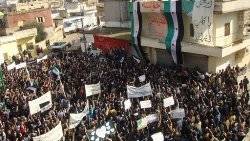Fourteen people have been killed after a bus transporting prisoners exploded in the northwestern Syrian province of Idlib, near the Turkish border, state media and activists have reported.
SANA state news agency said 26 others were wounded in an ambush that targeted the vehicle in Jisr al-Shughour area.
The Local Co-ordination Committees activist network confirmed the attack and the death toll, distributing footage purportedly showing the victims.
Al Jazeera's Zeina Khodr, following events in Syria from neighboring Lebanon, said the police vehicle may not have been deliberately targeted.
"There are roadside bombs planted [by the opposition] all along the highway in that area," she said. "The police vehicle may have been targeted unintentionally."
Idlib, the base of many defected soldiers, has become a stronghold of the armed opposition, which has been targeting army convoys to prevent them from regaining pockets of territory under the opposition’s control.
"This is strategic territory because it could provide them with a supply route to Turkey," our correspondent said.
Syrian activists in the Turkish border city of Antakya blamed the bus explosion on the government, saying it was carried out to "get rid of prisoners".
'Heavy clashes'
The blast followed reports of heavy clashes between the Syrian army and defectors in Idlib. Opposition activists said nine regular troops were killed by defectors.
Mohammad Fizzo, an activist on the Turkish side of the border, told Al Jazeera there were many injured on both sides.
"A group of soldiers who were defected were trying to escape to Turkey when the government forces raided the bordering villages of Ain al-Beida and Khorbat al-Joz using heavy weapons and mortars," he said.
Earlier in the day, activists posted videos of what they said were soldiers in Idlib announcing they had sided with the opposition in protest against the government’s crackdown on dissent.
The latest report of violence came a day before a scheduled meeting between Arab League observers and the bloc's foreign ministers in Cairo to decide their future course of action after the culmination of their one-month mission in the country.
The widely criticized regional bloc mission hangs in the balance as General Mohammed Ahmed Mustafa al-Dabi, its head, prepares to report to the ministers, who will decide whether to extend it for a second month.
Opposition critical
Ali Jarush, Arab League deputy chief of operations, said Dabi is satisfied with the achievements of the operation so far and that "everything indicates that the observer mission in Syria will be extended by a month".
"Dabi sees that in the last phase the necessary thrust [of the operation] was achieved" after more monitors were deployed and fanned across 20 areas and after they were provided with equipment and logistics which they previously lacked, Jarush said.
But the Syrian National Council (SNC), the main opposition group, charged that the report may not accurately reflect the situation in Syria.
The report should make a clear difference between the victim and executioner," SNC spokesman Mohammed Sermini said, adding that "leaks" indicate that the report says monitors are unable to determine who is doing the killing.
Critics say the Arab mission has only provided diplomatic cover for President Bashar al-Assad to pursue a crackdown that has already killed more than 5,000 people according to a UN count.
Hundreds of people have been killed since the monitors arrived in Syria, where an armed revolt has grown in recent months, contesting Assad's grip on several parts of the country.
Some activists reported as many as 740 civilians were killed in total in the last month.
The deterioration of the security situation in the country has prompted the US to consider closing its embassy in Damascus.
The threat to close the embassy comes in the wake of two alleged suicide car bombings in Damascus last month that left at least 44 people dead.
PHOTO CAPTION
Demonstrators protest against Syria's President Bashar al-Assad after Friday prayers in Hula, near Homs, January 20, 2012
Al-Jazeera

 Hajj virtues
Hajj virtues